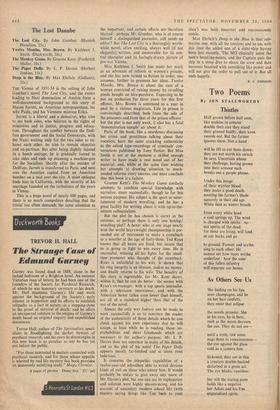The Lost Danube
THE Vienna of 1931-34 is the setting of John Gunther's novel The Lost City, and the events leading to Nazi domination of Austria form a well-documented background to this story of Mason Jarrett, an American newspaperman, his wife Paula, and his Viennese mistress Erika.
Jarrett is a liberal and a democrat, who tries to see both sides, who believes in the rights of minorities and in justice, progress and educa- tion. Throughout the conflict between the Doll- fuss government and the Social Democrats, with the Nazis waiting only for the two sides to ex- haust each other, he tries to remain objective and un-partisan. But after being slightly injured in a bomb outrage, he is gradually forced to take sides and ends up manning a machine-gun for the Socialists. Shortly after the murder of Dollfuss, Jarrett is transferred to Paris, and next sees the Austrian capital from an American bomber on a raid over the city. A quiet epilogue finds him in California, with the security of his marriage founded on the turbulence of the years in Vienna.
This is a huge novel of nearly 600 pages, and there is so much compulsive detailing that the trivial too often demands the same attention as
the important, and certain effects are therefore blurred: perhaps Mr. Gunther, who is of course himself a distinguished journalist, still needs an editor? But The Lost City is a thoroughly worth- while novel, often exciting, always well (if not elegantly) written, and memorable for its cen- tral character and its lovingly-drawn picture of pre-war Vienna.
Miss Kathleen J. Smith has made her mark as an advocate of reform in women's prisons, and she has now turned to fiction in order, one assumes, further to promote her ideas. Twelve Months, Mrs. Brown is about the case of a woman convicted of raising money by re-selling goods bought on hire-purchase. Expecting to be put on probation for three years for this first offence, Mrs. Brown is sentenced to a year in gaol by a vicious magistrate. Life in prison is convincingly described, both from the side of the prisoners and from that of the prison officers: but the plot is not only weak, it also has a fatal 'demonstration sample' air about it.
Parts of the book, like a murderess discussing her crime and prostitutes talking about their vocation, have the same crackling authenticity as the edited tape-recordings of criminals' con- versations published by Tony Parker. But Miss Smith is not at the moment a skilled enough writer to have made a real novel out of her material, and, while at the same time wishing her attempts at drawing attention to much- needed reforms every success, one must conclude that this book is a failure.
Graeme Kent's The Monkey Game similarly attempts to combine special knowledge with narrative, more successfully, though to far less serious purpose. His subject is the sport or enter- tainment of modern wrestling, and he has a great facility for writing about it with up-to-the- minute colloquialism.
But the plot he has chosen is corny in the extreme; or perhaps there is only one boxing/ wrestling plot? A boxer who at one stage nearly won the world heavyweight championship is per- suaded out of retirement to make a comeback as a wrestler at the age of forty-three. Ted Ryan knows that all bouts are fixed, but insists that he is going to fight to win every time. He is successful, winning all his fights for the small- time promoter who thought of the comeback. Ryan is unfaithful to his wife, is shown that his ring integrity is an illusion, makes no money, and finally returns to his wife. The banality of this story is regrettable, for Mr. Kent shows, within it, that he can do better: the scenes with Ryan's ex-manager, with a top sports journalist, with a television interviewer, and with the American boxer fallen even lower than himself, are all of a standard higher than that of the rest of the novel.
Almost the only way fantasy can be made_to work successfully is so to convince the reader of the authenticity of those details which he can check against his own experience that he will accept, at least while he is reading, those im- probabilities and sheer falsehoods which are necessary to the author's purpose. Mr. L. P. Davies does not convince in many of his details, and so the plot of his novel The Paper Dolls appears merely far-fetched and at times even ludicrous.
It concerns the telepathic capabilities of a twelve-year-old schoolboy able to wreak devious kinds of evil on those who annoy him. It would probably be unfair to give away any more of Mr. Davies's plot, but one can say its explanation and solution were highly unconvincing, and his account of secondary modern school life (with masters saying things like 'CAA back to your class') was both incorrect and unconsciously comic.
Max Ehrlich's Deep is the Blue is that sub- marine one, with all the tensions and so on, with this time the added one of a sister-ship having been lost recently. The MO clinically notes the men's breaking-points, and the Captain puts the ship in a steep dive to shock the crew and then becomes besotted with something like power and will not give the order to pull out of it. But all ends happily.
B. S. JOHNSON


































 Previous page
Previous page